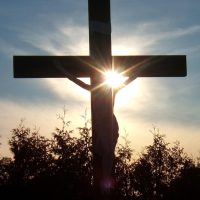One of my abiding memories of my time at Westminster College was an Old Testament lecturer who came into class one day and, instead of talking to us, broke into song. He sang all the verses of ‘Flower of Scotland’. He’s not Scottish, and it wasn’t Burns Night or anything. But when he’d finished, he told us why.
Flower of Scotland
The song is about the famous victory of the Battle of Bannockburn, when the Scots forces, led by Robert the Bruce, defeated the English army of Edward II. It sounds like an anthem that’s stood the test of time.
In fact it was written in 1965 by Roy Williamson of the Corries. But it caught on. It captured the spirit of the nation. By looking back to that famous victory of the past, it gave inspiration for future victories against the English, though these days I’m glad to say that this is on the sports field, not the battlefield. It’s sung at rugby matches, by the Scottish FA, and for the Scottish team in the Commonwealth games.
And when the crowd sing it, there is a real sense of solidarity, of saying, ‘This is who we are. This is the stuff we’re made of. This is our aspiration’.
Now, to get back to our Old Testament lecture. Our lecturer sang this to illustrate the idea that this is the kind of song we have in the psalms. Especially in a psalm like Psalm 67.
Psalm 67
Matthew 15:21-28
Let’s call to mind once more the image of somewhere like Murrayfield Stadium, and crowds of supporters singing ‘Flower of Scotland’ to spur on their team.
This is what the psalms were for.
Not all of them – some are more personal prayers. But many of the psalms were used in public worship, much as we sing hymns today, and these psalms say, for the people of God, ‘This is who we are. This is who God is; this is our aspiration’.
For the people of ancient Israel, their identity as God’s people was part and parcel of their national identity, so these songs had a double role.
For us: We’re not now looking for victory over other people, in war or sport or anything else. But we are fighting against the forces of the world that want to destroy life, the forces of injustice, and apathy, and greed. And as those forces seem to gather strength, we need to affirm our own strength and hope in God.
So let’s look in more detail at what this psalm is saying about us, and for us.
May God be gracious to us and bless us; may he cause his face to shine on us.
What an opening.
This is claiming the promise made to Abraham, that God would bless him. And you’ll remember that the blessing promised to Abraham was specifically the blessing of descendants – that God would make his descendants more numerous than the stars in the sky. For the people of Israel, this is a reminder that they are in that number – they are the descendants of Abraham, the heirs to the promise. For us, who do not trace our ancestry back to Abraham, the promise is extended to us through Jesus. The God of our ancestors in faith is still our gracious and loving God today.
There’s another echo here, in the blessing, ‘may he cause his face to shine on us’. This is the blessing that God gave to Moses, for his brother Aaron to give to the people:
‘The Lord bless you and keep you. The Lord make his face to shine upon you, and be gracious unto you; the Lord lift up his countenance upon you, and give you peace.’
Aaron was the priest, that’s why he gets to give the blessing. It’s sometimes known as the ‘Aaronic blessing’ after him. So this brings to mind the time when God led his people to safety, and guided them through the unknown places. It’s a reminder, to the people of Israel and to us, that even when the circumstances of our lives look far from promising, even when we’re not sure where we’re going or how to get there, God is still looking kindly upon us, still giving his blessing and his peace.
So we claim our promise and our blessing.
And then we look, in verse 2, at why God gives all this: ‘that your purpose may be made known on earth, your saving power among all nations’.
This is always the call to God’s people. In Isaiah, we read that Israel is called to be ‘a light to the nations, so that my salvation shall reach earth’s furthest bounds’. And in Matthew’s gospel, Jesus says to his followers, ‘You are the light of the world… Let your light so shine before people, that they may see your good works and glorify your father in heaven’.
We are called so that others may follow; we are blessed so that others may be blessed through us; and the promise we have received, is the promise that we are to share as generously with others as God has shared with us.
Well, there’s a cause for rejoicing and praise. Verse 3 and verse 5 are both the same: ‘let the peoples praise you, God; let all peoples praise you’.
It matters that it says ‘peoples’, with an s. It’s not just an old-fashioned way of saying ‘people’. It means ‘people from all nations’. When God’s promise is fulfilled, when God’s blessing is known, then the whole world will be singing God’s praises.
That was an important reminder for the people of Israel, who sometimes fell into the trap of thinking that they were God’s chosen people and the rest if the world didn’t matter. And it’s a reminder to us, too. I very much hope, in a church like this, in multicultural West London, that we are beyond treating anybody as an outsider because of their ethnic background. I don’t imagine we would consciously want to exclude anyone, for any reason, unless they posed a serious danger. But I wonder if there are people we exclude unconsciously, because they are not quite like us.
What, for instance, about the guests who come to the winter night shelter? They get away pretty briskly on a Sunday morning, as they are meant to do. But what if they came back at 10.30 for the service? Would we welcome them alongside us? What about people in non-traditional relationships? Are there groups of people whom we just assume would never be interested in God? What about wealthy business owners? I imagine there are some of those round here. I had a friend who was an Anglican curate in an affluent area; she described her ministry as ‘eye of the needle’ work, recognising that rich people sometimes had great need of God.
It sometimes helps to examines our own prejudices. And it’s worth remembering that we’re not alone; Jesus himself, we heard in our gospel reading, had to widen his own understanding of who was included in the grace and mercy of God. Even Canaanite women! Whatever next.
The psalm says, ‘let the peoples praise you, God; let all the peoples praise you’. We are to be a blessing for all the peoples, including, perhaps especially including, those we rarely think of.
It is as well to remember that, because verse 4 reminds us that we get no special favours from God for being here first. ‘Let nations rejoice and shout in triumph; for you judge the peoples with equity and guide the nations of the earth.’ God will judge other people with the same fairness and mercy as he judges us. In God’s eyes, the playing field is already level.
That’s not always very comfortable for those of us who are doing well – and in world terms, that’s all of us here. The call these days is for us all to protect our privilege – to secure our borders against refugees; to have gated communities that keep out the undesirables. But we can’t protect our status as God’s people; we can only capitalise on that when we share it.
So the psalm has looked back, to the promises and blessings of old, and it has looked forward, to the day when that promise and blessing is known throughout the world and all the peoples are praising God.
The last 2 verses bring us back to the present. The earth has yielded its harvest.
This is how the promise of God plays out. Alongside God’s promise to Abraham of descendants, is the promise implicit in creation itself that the world will sustain those people. And it is doing, still, though it seems increasingly under threat from human activity. The earth has yielded its harvest. We have food to eat – and a duty to care for those who don’t. The psalm leaves us dwelling in the goodness of God that is already in our lives.
Some members of a Christian congregation in Indonesia were accustomed to meet and talk together after the church service. One Sunday they were all feeling gloomy because a storm had damaged their church roof. Then someone said, ‘Instead of complaining about this misfortune, let’s tell one another about the things that have given us pleasure since we last met’. These are some of the things they spoke about:
One man who was a clerk said he’d just had a rise in salary
Another said that, for this first time in a year, his whole family had been at home together
One had had a letter from a son overseas
One had bought a new suit
One woman who had been shopping had got a place on a crowded bus
Another spoke of ‘hot water to wash in when I didn’t expect it’, realising that her grandparents had never had a hot water tap
A student had passed his exams
A girl had just been given a new computer
Ordinary things, maybe small things to us, but all things to be thankful for; all things that give a glimpse of the blessing of God. And remembering those smaller blessings gave them a better perspective on dealing with the larger problem. The earth has yielded its harvest. God is good to us.
If you have listened to the national and world news this week, it has been grim. Terror attacks in Spain and Finland; tensions in the United States; the aftermath of the mudslide in Sierra Leone. Divisions and hatred seem on the rise.
In our own lives, we know sorrow and sadness, insecurities about health, and we share concerns for others we love.
And yet we proclaim a gospel of hope. We stand together, as the people of God, in this congregation, in Christians Together in Central Ealing, in the worldwide fellowship of believers, and we say:
We have the promise of God; we have the blessing of God; a promise and blessing not for us but for the whole world; and we who know God’s goodness in our lives are called to proclaim it and live it and share it until all the world is praising God.
The earth has yielded its harvest. May God, our God, bless us. God grant us his blessing, that all the ends of the earth may fear him.
Let this be our anthem. Let this be our inspiration and our strength.
Amen.




